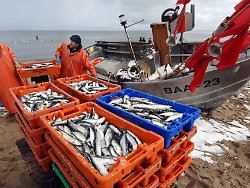Sunday 20th December 2020
Catch quotas are falling massively
Baltic fisheries are in deep crisis
For fishermen in the Baltic Sea, the job situation is becoming more and more critical due to falling fishing quotas. One of the reasons for this is climate change. Burglaries must also be expected in the North Sea because fishermen cannot sell their crabs there.
According to the Thünen Institute for Baltic Sea Fisheries in Rostock, fisheries on the Baltic coast are in the greatest crisis since reunification. "The crisis is so existence-threatening for many reasons that this branch of industry could actually be lost in large parts," said institute director Christopher Zimmermann of the German press agency.
The main reason is the falling quotas for herring and cod in the western Baltic Sea. With herring, 94 percent of the quota was lost between 2017 and next year. For cod, things look a little better after the five percent quota increase for 2021. "But if you compare the quantities with those of ten years ago, that's laughably little," said Zimmermann. In addition, if the young generation continues to be low, the quotas may be reduced again in the near future.
In the case of herring, this is primarily due to climate change, which leads to a drastic reduction in spawning. The water is too warm, the animals spawn earlier and the small crabs, the main food for the spawn, are not yet there. "What we urgently need is a crisp, hard and early winter." In addition to the increasingly difficult conditions in fishing, to which a bad public image also contributes, there are also official regulations, such as safety equipment, which make life more difficult.
Shrimp fishermen also fight
The shrimp fishermen on the North Sea coast also have to cope with massive failures. The producer group of German shrimp fishermen (EzDK) assumes that due to fishing breaks and a lack of sales opportunities, sales and catches will be roughly at the level of the already weak previous year 2019. That corresponds to only two thirds of the turnover of an average year, said managing director Dirk Sander. The producer group based in Cuxhaven includes around 100 companies between Sylt and Ditzum in East Frisia.
For a second producer group, the coastal fishermen of the North Sea, the prognosis looks even worse. According to managing director Günter Klever, the association assumes that its more than 30 companies will generate less than half of the turnover of a normal year. Accordingly, producer prices in 2020 were also at the weak level of the previous year, between three and five euros per kilo.
Less shrimp powder due to Corona
"There were enough crabs to catch, but we couldn't sell them," said Sander. Large traders in the Netherlands, for example, bought fewer shrimps because they could not be further processed. Due to the corona pandemic, capacities in the Moroccan peeling centers, where the crabs are peeled by hand, were reduced. In addition, hotels and restaurants were temporarily closed. The other coastal fishermen who are after flatfish, for example, also lacked these sales opportunities. Cutters therefore took breaks from fishing.
In addition to climate change, fishermen in the Baltic Sea also have to contend with the increasing number of gray seals. "The seals have learned to pull the meat off the bones of the herrings in the gillnet," said Zimmermann, head of the institute. In addition to losing the fish, this has another effect: "It takes much longer to pull an eaten fish out of the gillnet than a whole." If that happens with 20,000 fish, then it takes 20,000 minutes longer to get such a net clean and you have not yet made any money. "This is a threat to the very existence of the company and will mean that this fishing method is no longer worthwhile."
. (tagsToTranslate) Economy (t) Fishing (t) Fish (t) Baltic Sea (t) North Sea
